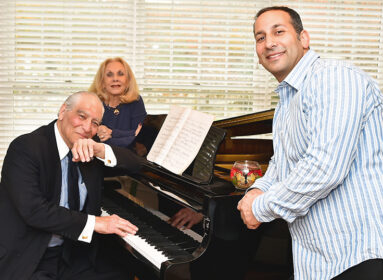
By Vera Schwarcz
Sometimes you can see a core value of Jewish life come alive before your eyes. This was my privilege in Bei Gou Village three weeks ago, on Shabbat – Parshat Noach.
The bar mitzvah “boy” was a former student and good friend; a well-known journalist, family man and founder of the Jewish community in Beijing. I was in town “by accident” – there to give some talks and interviews at Peking University.
But the older I get the more I have come to see such events as key to our soul growth in unplanned fashion. Ted had been my student at Wesleyan University more than three decades ago. This Shabbat he gifted me with an inner understanding of a key passage from Pirkei Avot: “I have learned more from my students than from teachers.”
Because of the soul journeys that China often ignites, this friend of mine had decided to start learning how to read from the Torah at age 53. His three sons all celebrated their bar mitzvahs in Beijing. Now, it was time for the father to build upon his special relationship of love and respect with Rabbi Shimon Freundlich, who had mentored his children.
Having undertaken this commitment, my former student was teaching all of us that it is never too late to learn more Torah, to make up for missed opportunities in an enriching fashion.
For me personally, it was especially moving to see the many-layered ties that bound my student’s family to that of Rabbi Shimon and Dini, co-directors of the highly successful Chabad of Beijing. I knew they had been friends for 16 years through both good and difficult times. I knew that their customs in the observance of Jewish traditions were quite different. Yet, during this Shabbat spent together in Bei Gou Village I witnessed a depth of mutual respect that I have never seen before.
Dini and the Rabbi came to this large and gracious vacation villa laden with many boxes of specially prepared food. Friday night, a small group of us prayed together, combining the songs of Chabad and those of the Reform-oriented Kehilat Beijing. The children and adults played board games together, and the evening was graced by good scotch and deep discussions about why and how we take on miztvot more consciously in later life.
At the special Torah service held on Saturday afternoon in the Brick Courtyard (a foreign-designed ecologically conscious lodge), more than 80 friends gathered to hear the bar mitzvah “boy” read from the Torah, as Rabbi Shimon explained every step of the service and its significance. Huge gaps in culture and Jewish observance were bridged by “ahavat Israel” – love of the Jewish people – that subtle glue of affection that binds long-bearded rabbis with young men who put on kippot rarely, and who were lovingly shown how to put on a tallit and how to voice various prayers. Women, with and without hair covering, Jewish and Chinese, all had a voice in the service, as well – reading eloquent summaries of the Torah portion which describes a righteous man who follows God’s commandments to the letter.
What lifted the whole bar mitzvah sky high (including the dancing with marvelous klezmer music by Chinese musicians) was both the letter and the spirit of the Torah. As Rabbi Shimon put it later as we headed back into the city: Ashrei ha am she kacha lo –“Blessed is a people who made holy by their devotion to God and to each other.”
Seeing Rabbi Shimon dance with my gray-haired student, kicking their heels high and then embracing with love, was a sight I will never forget.
Vera Schwarcz is emerita professor of history and East Asian studies at Wesleyan University in Connecticut. A China historian and poet, she is currently living in Jerusalem.
Readers are invited to submit original work on a topic of their choosing to Kolot. Submissions should be sent to judiej@jewishledger.com.








 Southern New England Jewish Ledger
Southern New England Jewish Ledger













